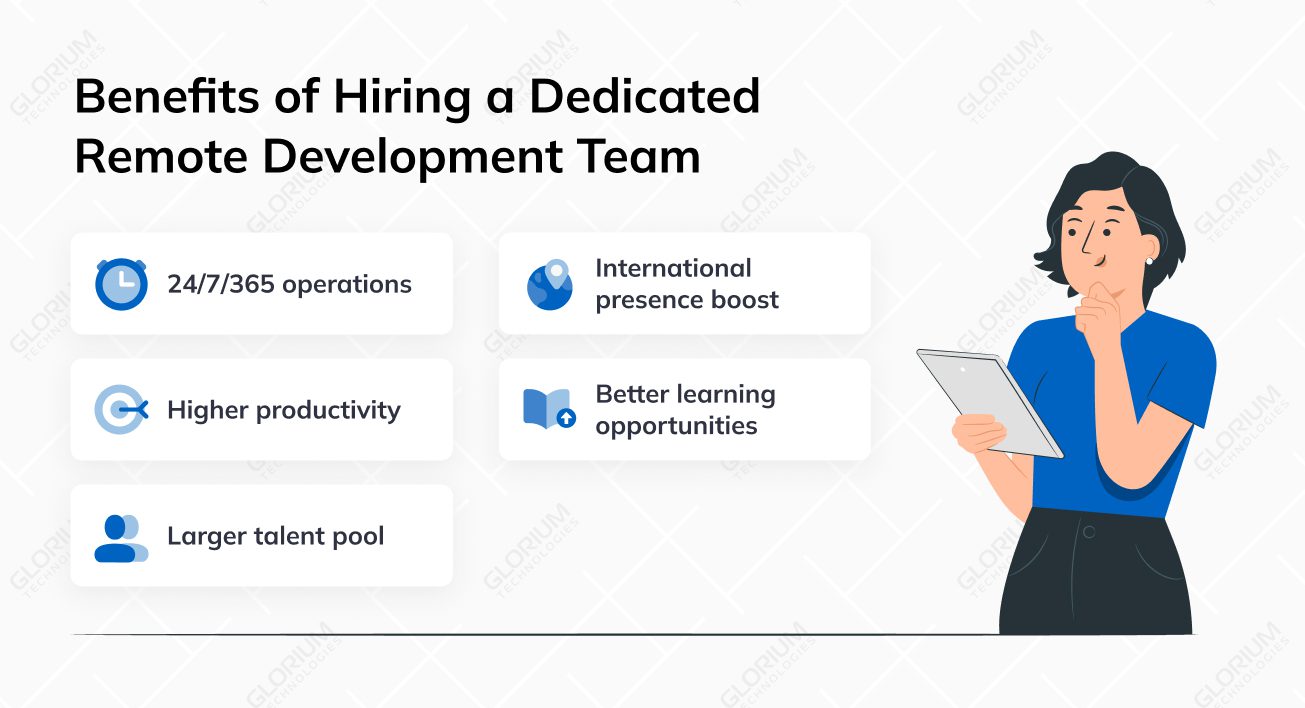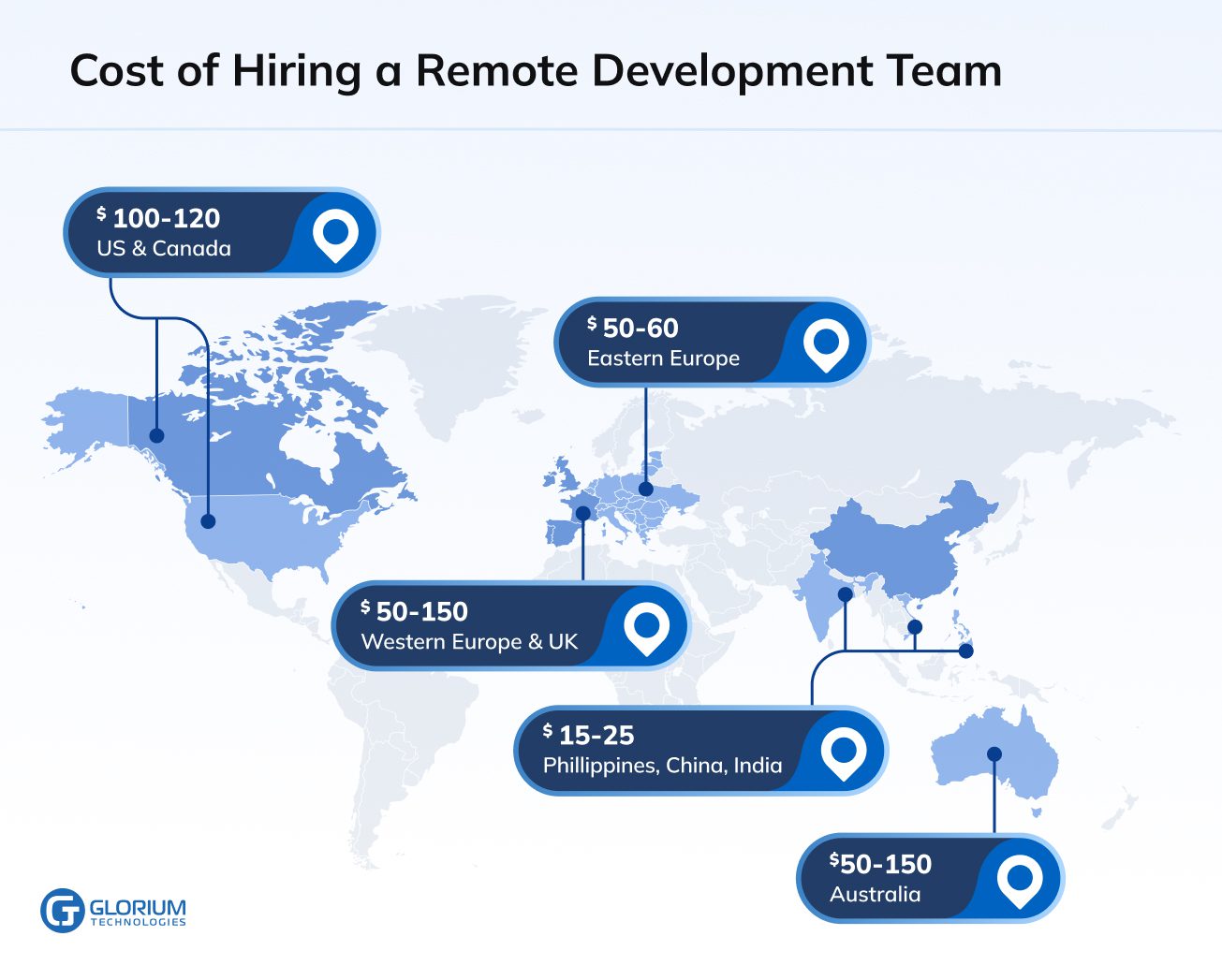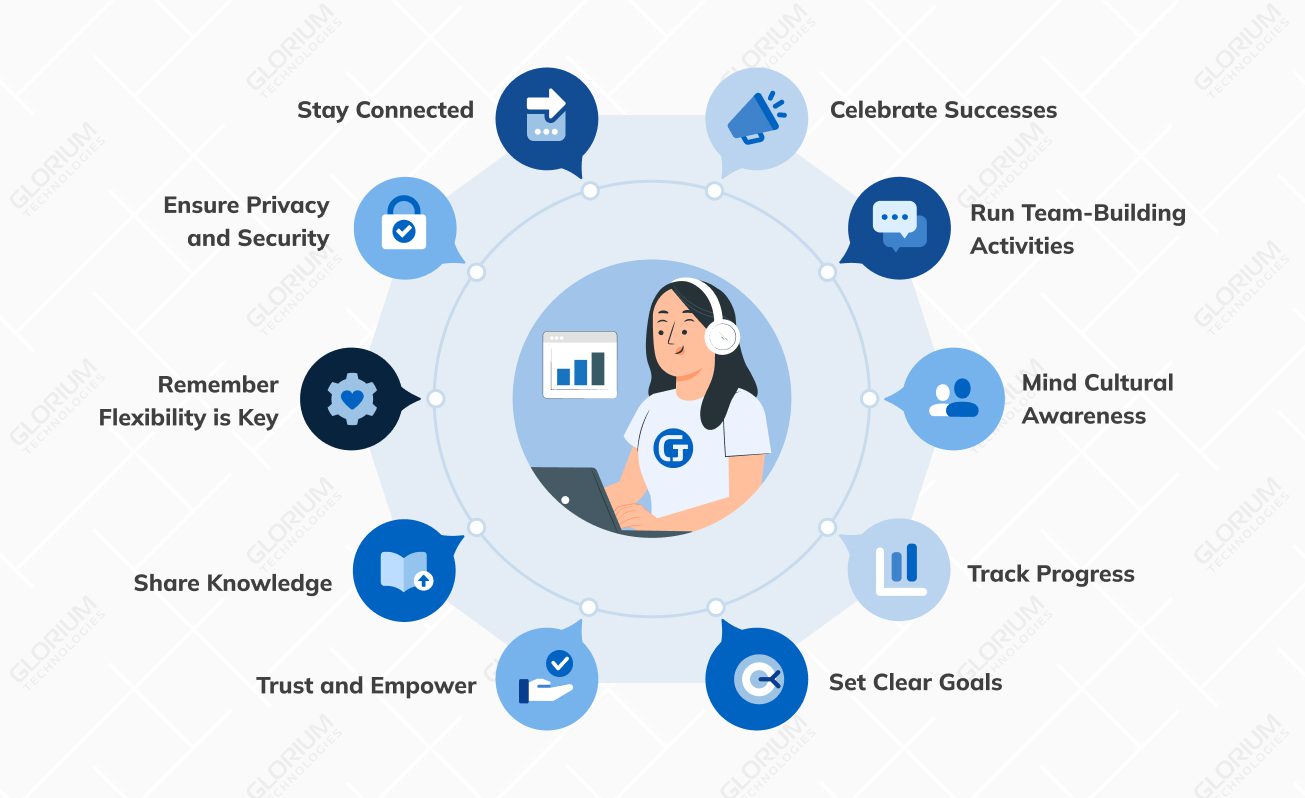
How To Hire a Remote Development Team: Tips for Founders



It might take only one genius to come up with a genuinely original, breakthrough idea. But to actually develop this idea and place it on the market, you will always need a team made up of a few professionals. Moreover, this team must be professionally assembled and managed.
Whether in tech or non-tech, putting together a dream team always was a challenge. Luckily, today headhunting is no longer limited by geographical boundaries or time zones. More companies, particularly those involved in IT, are increasingly choosing to hire remotely and internationally. It is common today to delegate strategic and tactical tasks to the remote software development team miles away from your headquarters.
At the same time, hiring remote developers is a very different task compared to hiring office-based employees. The initial conditions for hiring a remote team of developers must be taken into consideration: all interviews are online only, legal requirements of employment vary per country, plus there are time zone adjustments, language barriers, and cultural differences.
If hiring a remote team is so complex, why do people bother?
Content
It may not be apparent from the very beginning, but hiring globally nearly automatically means you are entitled to global competitive advantages. Some of these global benefits become apparent during the first week. Others become evident after several months. Let’s have a look at the impacts of hiring a remote team of developers on your business.
Imagine your team is scattered between Southeast Asia, Eastern Europe, and North America (Canada). What does this mean in terms of working schedules?
It means the working hours of your team fall within all the major time zones. Also, the timing of national holidays does not coincide. Moreover, preferential time for vacations does not coincide either. If designed strategically, your team would literally be operating all the time, without any interruptions.
This might become an incredibly huge benefit (and an unbeatable competitive advantage) if your product/services require constant chats or calls with customers. You may easily organize a 24/7 support team without extra expenses for overtime or night shifts.
According to Udemy report, people working in offices actually have a six-hour workday. How so? Because of smoking breaks, small talk with colleagues, coffee pauses, and so on.
Besides, at least 37% of respondents admitted they are regularly late in the mornings or have to leave early in the evenings.
If calculated per year and for an entire team, this would be a huge productivity loss.
Organizing work remotely means you are eliminating a huge portion of external distracting factors (office gossip, loud colleagues, phone calls around you, etc.).
Besides, you are the master of your own schedule when you work remotely. You get all the flexibility you need. For example, you can go to the gym during the day and then return to work after 9 p.m., if it’s convenient for you.
And don’t forget all those endless hours stuck in traffic when commuting. This time lost is completely eliminated in the case of remote work.
When you are hiring for the office, your choice is limited to one city (plus a one-hour driving distance, at best). If you’ve found a developer who is the perfect fit for your team/project, but they live across the country — you’d probably think twice about relocating. Relocation is a significant expenditure for any budget, especially when it involves a family.
When you choose to hire remote developers, your HR and operations budgets are much more affordable because an entire range of complications is automatically excluded from the list.
If you want to hire five teammates from five different parts of the world, go ahead, you can easily afford it.
Your portfolio of potential candidates can be limitless.
Hiring a remote development team is especially beneficial for SaaS vendors, e-commerce companies, and any other business interested in developing a global presence.
Having a team across several countries means you have official company representatives and “insiders” in all markets. International teams are helpful when you handle the intricacies of a local language or try to find a local partner. They can tell you who your competition is in the local markets, which platforms are better for placing ads, and so on.
Having an internationally diverse team means everyone gets to learn something new. This is an excellent opportunity for mentoring and coaching. Every team member arrives with their own unique work experiences and diverse backgrounds.
This is not only beneficial for a project and you as a founder but also for the hired developers themselves since a remote work environment is the perfect foundation for lifelong learning.
If you are unsure that hiring a dedicated development team is the best fit for your specific purposes, we can offer a checklist of questions. Not all of them would be mandatory or strictly applicable to your particular case, but it will act as a good starting point.

Answering the above questions as honestly as you can will give you a good feel for your personal readiness to hire remote developers.
As you see, аccess to a top-notch remote team of software developers is no longer a distant dream; it’s a reality that can transform your projects into resounding successes. With over a decade of experience in the field, our team of seasoned remote developers is here to help you hire a dedicated remote development team of skilled professionals tailored to meet your project requirements.
Here is a step-by-step guide on how to hire a remote team for your software project:
Start by clearly defining your project requirements. Include the type of development work needed, specific skills and technologies required, project timeline, and budget constraints. Consult the specialists to list all you will need to complete what you will start.
Research and choose reliable remote job platforms and job boards where you can post your job listing. Some popular options include Upwork, Freelancer, Toptal, and Remote.co. Also, make sure to scrape through what LinkedIn offers — you can use their advanced filtering tools to find specialists based on their skills or the projects they were involved in.
Create a comprehensive job description outlining the remote developers’ role, responsibilities, required skills, and qualifications. Be specific about the type of remote work arrangement, such as part-time, full-time, or project-based. Put it out to the platforms of choice and send out to your desired candidates.
Review applications and resumes to shortlist potential candidates. Look for relevant experience, technical skills, and cultural fit with your team and company values. A good practice is to pick ten strong candidates you are most interested in. Keep the rest for another time or share them with your partners who may also be in search.
Conduct initial interviews with shortlisted candidates via video calls or phone calls. Tell them about your project and company in detail to determine their interest. Then assess their technical expertise, problem-solving abilities, communication skills, and remote work experience.
For candidates who pass the initial interviews, consider assigning them a small test task or project related to your development requirements. A good practice is to pay for the test task, especially if this is something that you plan to use in your actual work. The test result will help assess the candidate’s hands-on skills and how well they fit your project.
For candidates who perform well in the test task, check their references and review their portfolio or past work samples to verify their track record and reliability. You may want to call their previous managers, ask for a brief recommendation on the person, and double-check if they can be a good fit for your team.
Narrow down the candidate pool further and conduct final interviews with the top candidates. Involve key team members or stakeholders in the final interview process. Usually, these would be your chief technical officer for tech skills evaluation, and chief HR, along with the team leader who should have been already involved in the previous steps.
Ensure that the remote developers you choose have strong communication skills, as effective communication is vital for remote team collaboration. Ask them how they handled the cooperation and possible conflicts in the previous teams. Ask open-ended questions and provide theoretical setups to encourage the communication out of the beaten path of the formal interview.
Once you’ve selected the right development team, negotiate the terms of the contract, including rates, working hours, project milestones, and confidentiality agreements. Don’t be shy to do a little back-and-forth dance here until you reach the settlement that everyone is happy with.
Provide the selected remote developers with all necessary onboarding materials and resources to integrate them smoothly into your development team. Allocate a series of one-on-ones or a big group meeting in the first week to introduce your remote development team to all the stakeholders, and make sure to share all the necessary materials depending on the role.
Establish clear communication channels and use collaboration tools like project management software, version control systems, and chat platforms to ensure efficient remote teamwork. A good idea is to incorporate the new hires into your existing channels, as it will provide easier access to the data and encourage communication.
Maintain regular communication with the team and provide constructive feedback to foster a collaborative and productive working relationship. Make sure you give feedback as soon as you are not happy with any part of the project — don’t let it linger.
In the case of working with a remote dedicated development team, keeping everyone in the loop is an absolute necessity. Regularly track the progress of the development work and ensure that project milestones are met according to the agreed-upon schedule.
Promote team building and engagement among remote developers by organizing virtual team meetings, and social events and recognizing their contributions to the project. The team lead’s and coordinator’s task here is to come up with excuses to get together on Zoom at least once quarterly to chitchat, check in on everyone’s life situation, share pains, and celebrate milestones together.
By following these steps, you can effectively hire a competent and reliable remote software development team to work on your projects and achieve success in your software development endeavors.
When you are looking to hire a remote software development team, cost considerations often shape the decision-making process. Understanding the factors that influence the cost can empower you to make financially sound choices while securing the best talent.
Below are the key elements that impact the cost of hiring a remote development team:

Though all of the above is not cheap, the unbeatable benefit of hiring a remote software development team is the speed of onboarding and offboarding people as you need, where you need them. Having most of your development workforce functioning in an augmented mode allows your business to save massive sums of money on overhead and operational expenses.
The thing you want least when hiring a team of developers is to not learn the lessons from everyone who has done it before. Read on and find out how to avoid making the most common mistakes.
Sounds silly? One of the most common mistakes, though. Many companies want to hire stars, but they also need to be more explicit about the standards and scope of the jobs. When they need more, the company hires two or three experts more than needed. Or it brings together a bigger team than the project needs.
How to avoid: Set a goal and make a list of the jobs you want to give to other people. Set a budget so you can see what you can do.
Sometimes, a company will hire the lowest-priced specialist coders. The results are depressing. Later, more expensive pros will have to fix the mistakes that failed collaborations made.
How to avoid: A low price is a red flag. It means the provider can only attract people with this limited instrument. They probably lack a good resume and comments from people who were happy with their work. Browse through work samples and reviews to make an informed decision here.
It leads to hiring workers who haven’t had much experience and have lied on their CVs.
How to avoid: Plan the interview and tests so you can learn as much as possible about the candidate. Bring in an outside IT expert or an experienced employee who works for your company. Call the candidate’s references and ask them questions.
Sometimes, the person conducting the interview is so focused on checking hard skills that they forget to ask about soft skills. And that’s a shame because they teach you how to work with others, take responsibility, and solve problems.
How to avoid: Set aside time during the interview to ask about group skills, how candidates organize their work, and how they solve problems.
It can cost too much to want to reach a goal as quickly as possible. Some companies plan a short- or medium-term project without considering how many jobs there will be or how hard they will be. But then the timeline extends, and the goals shift, it impacts everyone, and the cost, too.
How to avoid: Before you hire someone, talk to a product development expert about the tasks and dates.
One of the most essential questions in this hiring process is choosing your preferred method of remote employment — hiring an entire team or standalone freelancers. Both methods have their advantages. Let’s have a closer look.
If your project is a complex and long-term one, you need a dedicated team with an established rapport and a history of previous (successful!) projects.
It might take a little more time to negotiate the employment conditions if an entire team is involved. However, the end result would compensate for the initial time invested to get things going. Dedicated teams are known to be the most productive, efficient, and well-organized.
However, hiring four standalone freelancers may be your best option if you need a simple team of four people: one developer, one tester, one UX designer, and one content writer. Doing so would be more cost-effective than hiring a premade team.
Hiring freelancers is significantly cheaper than hiring a complete dedicated team. This is a solid economic advantage in the early stages of product development.
Yet, at later stages, having separate freelancers can turn into a disadvantage, because:
In a dedicated team, each member is personally interested in the excellence of the result. In around three-quarters of all cases, hiring a dedicated remote development team would be a much better choice than hiring freelancers one by one. To say the very least, group hiring saves a tremendous amount of time.
However, this does not mean hiring an entire team is the secret sauce for solving all managerial problems simultaneously.
Imagine a situation where you’ve just hired an entire team of 10-15 developers only to realize you can’t manage them properly. This would be a huge expenditure that was spent in vain and a tremendous loss of precious time.
To avoid this situation, use the methods from the next section.
Managing a remote software development team is like coordinating a group of talented individuals from different parts of the world to create a masterpiece. Here are some practical and friendly methods to do it successfully:

If you’re steering a remote team of developers, here’s a friendly tip to keep everyone sailing smoothly while avoiding burnout. First off, make sure your crew maintains reasonable working hours so they’re not burning the midnight oil. Help them create cozy home offices to keep work and personal life from getting tangled up. And here’s a little extra: think about offering them a budget for sprucing up those home offices. It’ll make them feel less isolated and more connected.
Solomiia BashukTalent Acquisition Specialist, Glorium Technologies
By following these methods, you’ll have a remote dedicated development team that works together harmoniously, despite the physical distances. It’s all about fostering collaboration, communication, and trust to create an amazing project together.
If you want all processes to go smoothly, first you need to identify team leads or managers who can guide and support the team. Involve these people from the very start — ideally, they should be the ones overseeing the hiring process. Having clear reporting structures helps in making decisions, providing feedback, and ensuring smooth coordination within the team.
To get an idea of how the development team functions, it’s good to know the roles and responsibilities of a remote development team:
| Role | Who they are | What they do | What they need |
| Developers/Engineers | These are the backbone of the team. They are responsible for writing code and bringing the software to life. | Developers collaborate with other team members to understand requirements, design solutions, and implement features. | They need strong technical skills, problem-solving abilities, and the ability to work efficiently with code versioning systems like Git. |
| Project Managers | Project managers play a crucial role in keeping everything on track. | They oversee the entire project, set timelines, and ensure that deliverables come on time. They are responsible for resource allocation, risk management, and handling communication with stakeholders. | Effective project managers possess excellent organizational skills, leadership abilities, and understanding of the development process. |
| Quality Assurance (QA) Testers | QA testers are responsible for ensuring the software’s functionality and quality. | They perform thorough testing to identify bugs, errors, and usability issues. QA testers work closely with developers and designers to ensure that the final product meets the required standards. | They need strong attention to detail, critical thinking skills, and the ability to create comprehensive test cases. |
| UX/UI Designers | User experience (UX) and user interface (UI) designers focus on creating a user-friendly and visually appealing product. | They work closely with developers to translate wireframes and mockups into interactive interfaces. UX/UI designers conduct user research, create prototypes, and optimize the software’s usability. | They require creativity, knowledge of design tools, and a deep understanding of user behavior. |
| DevOps Engineers | DevOps engineers bridge the gap between development and operations. | They are responsible for managing deployment processes, automating tasks, and maintaining the infrastructure that supports the software. DevOps engineers aim to improve collaboration between development and IT operations, leading to faster and more reliable software releases. | They need expertise in various tools and technologies for continuous integration and continuous deployment (CI/CD). |
| Product Owners/Stakeholders | Product owners or stakeholders are typically representatives from the client’s side or the organization that initiated the project. | They define the project’s vision, goals, and requirements. They work closely with the development team to prioritize features, review progress, and provide feedback. | Product owners need strong communication skills and a grasp of the project’s objectives. |
Assigning these roles with clear responsibilities ensures that each team member knows their part in the project and contributes effectively to its success.
Glorium Technologies is the company that businesses go to when they want to hire helpful, dedicated developers. We have your back whether you operate in the US or anywhere else in the world.
We are experts at making high-quality solutions for different fields, such as healthtech and real estate. What’s the best? We have many teams of experienced developers who know everything there is to know about these niches.
But that’s not all. We also bring in business analysts and other experts to make sure your projects shine like stars. Glorium is here to help you make your development dreams come true, no matter how big or long your project is. So why hold out? Contact Glorium Technologies today and let the magic of coding begin!
To ensure reliability and expertise, thoroughly vet potential remote development partners. Check their portfolios, client reviews, and case studies. Request references and talk to their previous clients to gauge their performance. Conduct technical interviews and test assignments to assess their skills. Choose a team that aligns with your project requirements and has a proven track record in your industry.
Look for a team that exhibits strong communication skills, proactive problem-solving abilities, and adaptability. Team members should be self-driven and capable of working independently while staying aligned with your project’s goals. Additionally, cultural fit and the ability to collaborate effectively are crucial aspects to consider.
Invest in collaborative tools and project management software that enable smooth communication and efficient project tracking. Platforms like Slack, Zoom, Microsoft Teams, or Asana can facilitate real-time interactions, file sharing, and task management. Prioritize security and data privacy when selecting tools.
Setting clear expectations is essential for project success. Clearly define project goals, deliverables, and timelines. Establish communication protocols, meeting schedules, and preferred methods of reporting progress.
Effective collaboration relies on constant communication and trust. Schedule regular team meetings, stand-ups, and one-on-one catch-ups. Encourage an open and transparent culture where team members feel comfortable sharing ideas and concerns. Foster a sense of camaraderie with team-building activities, even if conducted virtually.
Time zone differences can be managed by finding overlapping hours for crucial communication and collaboration. Be flexible with working hours and consider asynchronous communication tools when real-time interactions are not feasible. Establish a shared calendar with transparent schedules to ensure everyone is on the same page.
Protect data security by setting up secure communication channels and using encrypted platforms. Sign Non-Disclosure Agreements (NDAs) with the remote team to safeguard sensitive information. Regularly update software and implement security measures to prevent data breaches.
The ideal number of people for a remote software development team can vary depending on the project’s complexity and scope. However, smaller teams of 5-8 members often promote better communication and collaboration, making it easier to manage tasks and maintain efficiency.









| Cookie | Duration | Description |
|---|---|---|
| cookielawinfo-checkbox-analytics | 11 months | This cookie is set by GDPR Cookie Consent plugin. The cookie is used to store the user consent for the cookies in the category "Analytics". |
| cookielawinfo-checkbox-functional | 11 months | The cookie is set by GDPR cookie consent to record the user consent for the cookies in the category "Functional". |
| cookielawinfo-checkbox-necessary | 11 months | This cookie is set by GDPR Cookie Consent plugin. The cookies is used to store the user consent for the cookies in the category "Necessary". |
| cookielawinfo-checkbox-others | 11 months | This cookie is set by GDPR Cookie Consent plugin. The cookie is used to store the user consent for the cookies in the category "Other. |
| cookielawinfo-checkbox-performance | 11 months | This cookie is set by GDPR Cookie Consent plugin. The cookie is used to store the user consent for the cookies in the category "Performance". |
| viewed_cookie_policy | 11 months | The cookie is set by the GDPR Cookie Consent plugin and is used to store whether or not user has consented to the use of cookies. It does not store any personal data. |